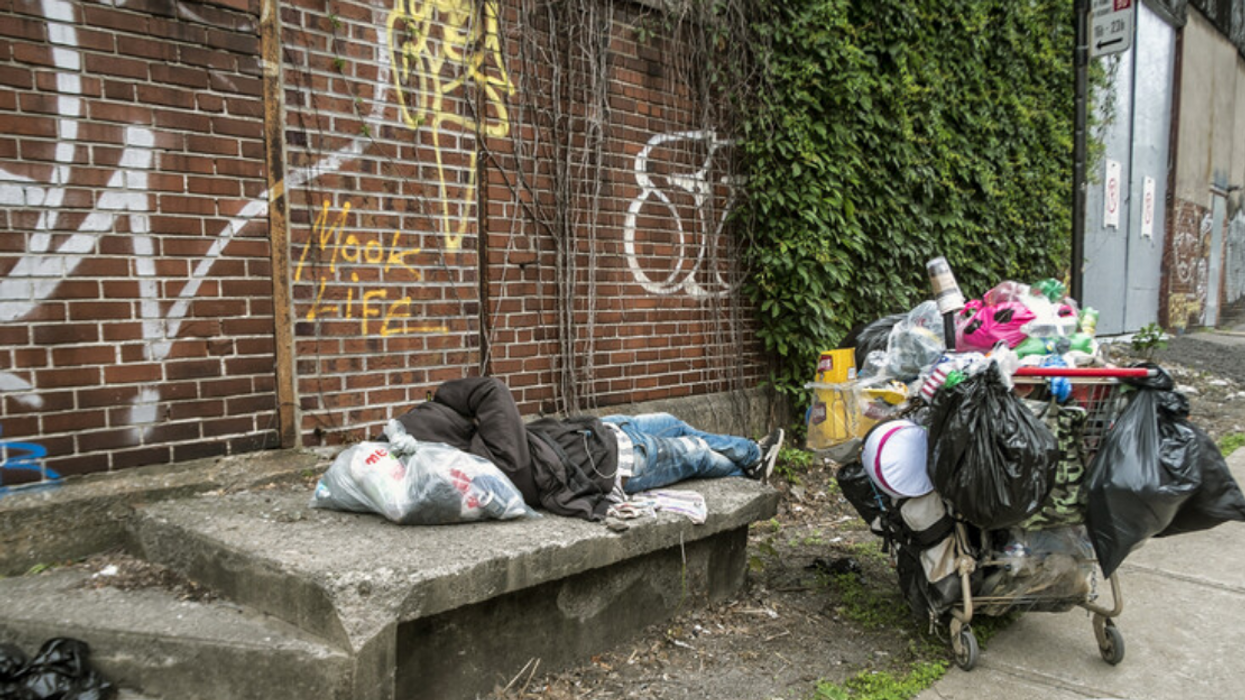Canada's 'Poverty Report Card' is out and Quebec's grade may surprise you
Almost every province flunked the affordable housing section.

An unhoused person with a shopping cart of belongings in Griffintown.
As Canadians struggle to keep up with the rising cost of living, a charity is giving each province its own "Poverty Report Card" — and, when it comes to issues like food insecurity and welfare, Quebec's grade stands out.
While the overall results paint a bleak picture, and Quebec's poverty reduction efforts are far from A+ worthy, we also aren't graduating at the bottom of this year's class. In fact, quite the opposite is true.
"The majority of governments in Canada received 2024 Poverty Report Cards grades in the D range. Seven out of 10 provinces received a D- for their insufficient approach to poverty reduction, which means no province is demonstrating an acceptable level of poverty reduction efforts," said Phil Ozga, chief network and government relations officer at Food Banks Canada, the organization responsible for creating the report cards.
Quebec and Prince Edward Island were the only two provinces to score above D+. P.E.I. got a C- and Quebec got a C+ — the best grade in the country.
Even though Quebec is leading the nation in terms of poverty reduction, just like last year, our standing still slipped from a B- in 2023, which a Food Banks Canada press release says is because "policy actions taken in prior years have not kept pace with the rising cost of living."
Quebec also got a big fat F on the affordable housing category of the report card with 40.5% of the population spending more than 30% of their income on housing.
Overall, the report cards are broken down into four sections: experience of poverty (we got a D+), poverty measures (we got a B-), material deprivation (we got a C) and legislative process (we got a B). Each section is further broken down into various "indicators."
Quebec's only A was for "Provincial Welfare as a Percent of the Poverty Line (Singles)" in the Poverty Measures section.
Food Banks Canada recommends that Quebec should "establish a new poverty reduction strategy, with the ambitious goal to end poverty by 2030" and "establish parity for disability social assistance rates" in order to improve its grade.
Here's how all the provinces fared on their report cards:
- British Columbia: D+
- Alberta: D-
- Saskatchewan: D-
- Manitoba: D-
- Ontario: D-
- Quebec: C+
- Newfoundland and Labrador: D-
- New Brunswick: D-
- Nova Scotia: D-
- Prince Edward Island: C-
Only Nova Scotia (F in 2023) and Prince Edward Island (D+ in 2023) improved their grades "thanks to an improved legislative focus on poverty reduction over the past year," according to Ozga.
Overall, Food Banks Canada's report found that 44% (almost half) of Canadians feel like they're in a worse place financially than they were last year with one in four of us experiencing food insecurity. All but one province failed the affordable housing section.
"Though deeply concerning, these results are sadly unsurprising to the thousands of food banks across the country who have seen a 50 per cent increase in visits since 2021," said Food Banks Canada CEO Kirstin Beardsley.
"All levels of government and all jurisdictions working together is the only effective way to decrease and reverse poverty and food insecurity. Food Banks Canada's 2024 Poverty Report Cards clearly show that sustained, collective effort from all governments is our greatest hope for real and lasting change."
You'll find the full report cards and methodology on the Food Banks Canada website.
This article's cover image was used for illustrative purposes only.
